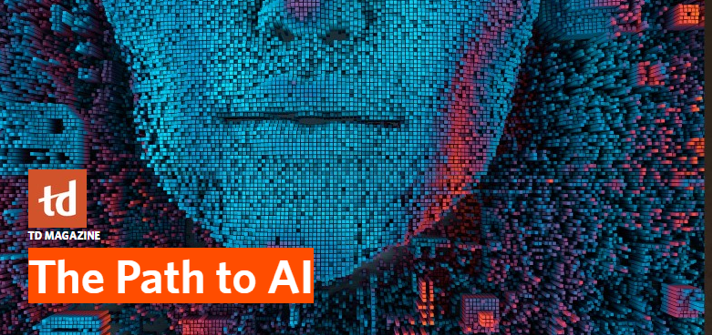
by Editor | Jan 12, 2020 | News
Artificial Intelligence (AI) is poised to be the next world-altering technology. While there is still plenty of work to be done to capitalize on AI’s ultimate potential, the technology is already becoming a ubiquitous part of everyday life: entertainment and shopping recommendations, text message autocomplete, voice assistants, and even traffic lights. They all use AI to shape the user experience and improve productivity.
AI is changing how work gets done. For example, smart assistants can now handle the basic but annoying chore of scheduling team meetings. And in warehouses, robots algorithmically scurry about gathering products for their human counterparts to ship. Regardless of the industry, knowledge and skill requirements are changing quickly for anyone who wants to play a role in the future of work.
Research from EY shows that AI is increasing workplace operational efficiency and helping organizations make faster, smarter decisions. The generalized fear that AI will take away all human jobs may have subsided, but McKinsey research indicates that up to 50 percent of job tasks are technically automatable. Forbes revealed that 80 percent of CEOs see AI as a critical component of their digital transformation strategy.
According to Michael Dukakis Institute for Leadership and Innovation (MDI), AI technology can be a force for helping people achieve well-being and happiness, unleash their potential, obtain greater freedom, relieve them of resource constraints and arbitrary/inflexible rules and processes, and solve important issues, such as SDGs.
The original article can be found here.
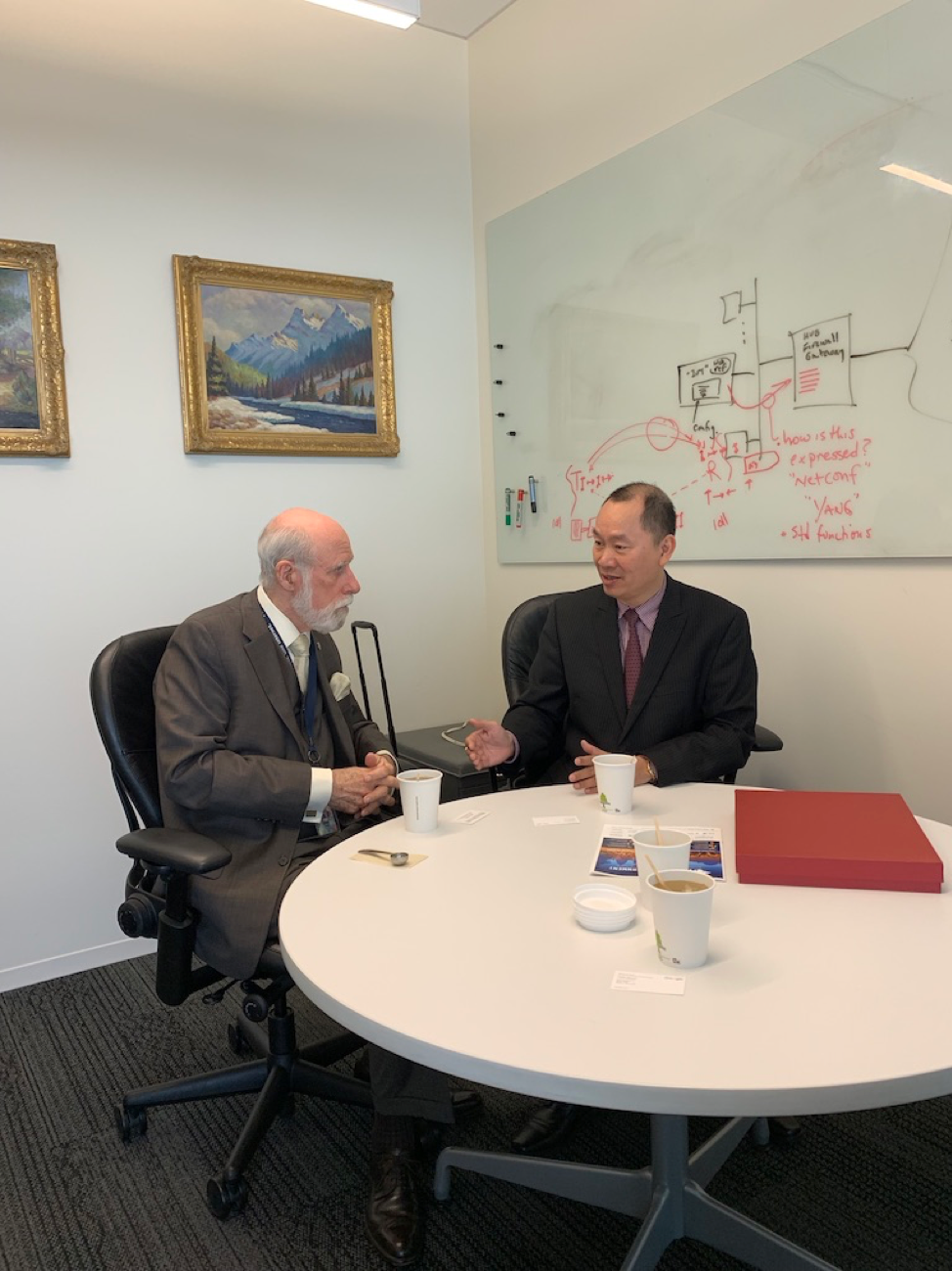
by Editor | Jan 6, 2020 | News
On December 12, 2019 at Global Cybersecurity Day Symposium, the AI World Society Innovation Network (AIWS-IN) was officially launched at Loeb House, Harvard University. Leaders of AIWS-IN are mentors and co-founders: Governor Michael Dukakis, Father of Internet Vint Cerf, Professor Alex Sandy Pentland (MIT), Professor Nazli Choucri (MIT), Professor Thomas Patterson (Harvard), Professor David Silbersweig (Harvard), Mr. Nguyen Anh Tuan (the Boston Global Forum), and Professor Christo Wilson (Northeastern), as well as President of World Leadership Alliance-Clubde Madrid and former President of Latvia, Vaira Vike-Freiberga.
The Father of Internet and one of Mentors of AIWS-IN will be honored as a World Leader in AI World Society at AIWS-G7 Summit Conference on April 25, 2020 at Loeb House, Harvard University. He is also presented the Turing Award.
https://aiws.world/the-aiws-innovation-network/461/
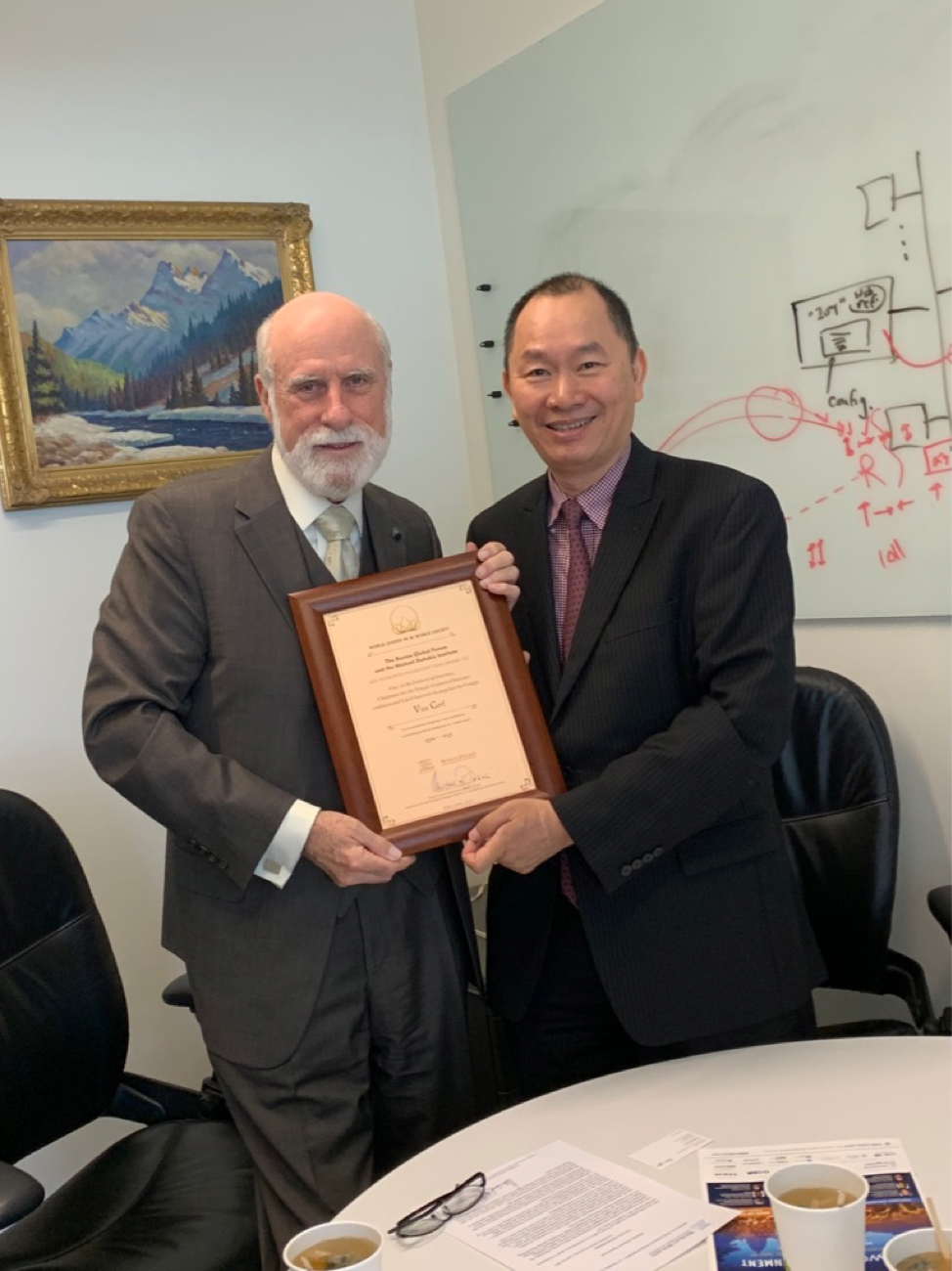
by Editor | Jan 6, 2020 | News
Vint Cerf will be a speaker at AIWS Summit 2020, which is co-organized by World Leadership Alliance-Club de Madrid (WLA-CdM) and the Boston Global Forum on April 28-29, 2020 at Harvard University.
WLA-CdM is the largest forum of democratic former Presidents and Prime Ministers, and acts to strengthen democratic leadership and institutional capacity to better tackle major global challenges. At AIWS Summit 2020, Boston Global Forum will officially launched the AIWS Social Contract 2020 and a report on Monitoring AI developments and uses by governments, corporations, and non-profit organizations to assess whether they comply with the norms and standards codified in the AIWS Social Contract 2020. Noncompliant actors will be identified and publicized through fact-based reports.

by Editor | Jan 6, 2020 | News
In a preliminary test, a model trained only on data from UK women still performed better than experts on US patients.
The news: DeepMind and Google Health have developed a new AI system to help doctors detect breast cancer early. The researchers trained an algorithm on mammogram images from female patients in the US and UK, and it performed better than human radiologists. The results were published in Nature on Wednesday.
A tragedy of errors: Breast cancer is the most common cancer for women globally, and their second leading cause of death. Though early detection and treatment can improve a patient’s prognosis, screening tests have high rates of error. About 1 in 5 screenings fail to find breast cancer even when it’s present, also known as a false negative; 50% of women who receive annual mammograms also get at least one false alarm over a 10-year period, known as a false positive.
The results: In tests, the AI system decreased both types of error. For US patients, it reduced false negatives and positives by 9.4% and 5.7%, respectively; for UK patients it reduced them by 2.7% and 1.2%. In a separate experiment, the researchers tested the system’s ability to generalize: they trained the model using only mammograms from UK patients, and then evaluated its performance on US patients. The system still outperformed human radiologists, reducing false negatives and positives by 8.1% and 3.5%.
Human and machine: Ultimately, both studies conclude that such AI breast cancer screenings should be used in tandem with human radiologists. The combination achieves the most accurate diagnostic results but still reduces the workload on human radiologists, which would help free up their time to focus more on patient care.
AIWS Innovation Network (AIWS-IN), with the domain name AIWS.world, connects distinguished professors, scholars, innovators from top universities such as Harvard, MIT, Princeton, Stanford, Yale, Columbia, UC Berkeley, UCLA, University of Pennsylvania, Brown, Oxford, Cambridge, and more, as well as companies such as Google, IBM, Microsoft, and others, to provide services for governments, companies, and organizations. The AIWS-IN was launched on December 12, 2019 at Harvard University, and will begin to operate from January 1, 2020.
The original article can be found here.
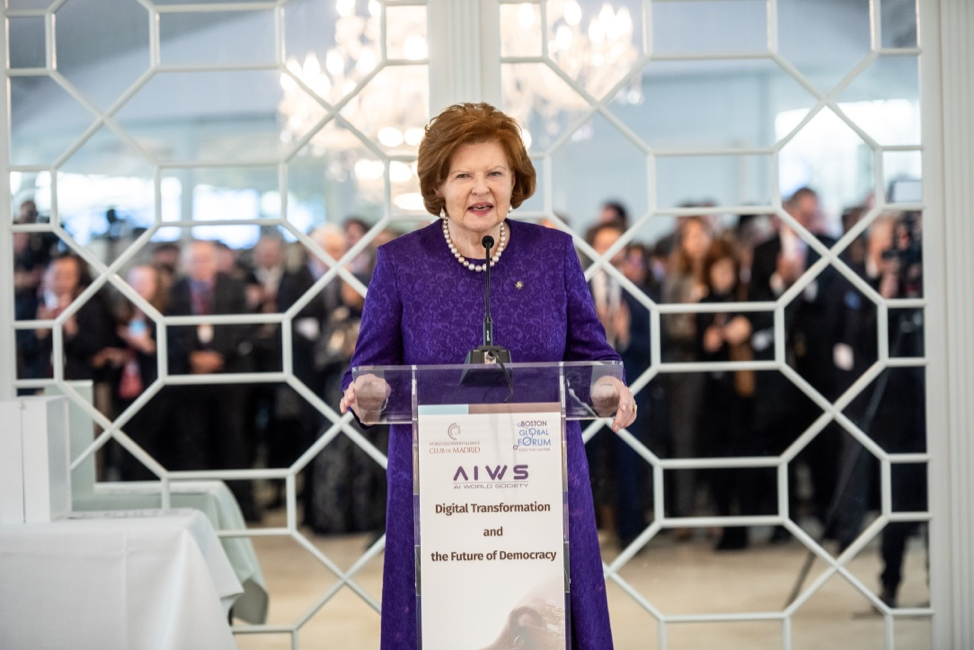
by Editor | Jan 6, 2020 | News
Here is the highlight from President Vaira Vike-Freiberga’s essay:
The only thing missing in the AI world is Smart people who will be smarter all on their own, without aid or support of electronic props and prostheses. Who needs to be able to quote poetry or remember any facts, when they can be instantly summoned by a few flips of the finger? But what happens to human faculties when they all but go dormant, especially after a certain number of generations? There used to be a story told to biology students about a species of salamander that had been discovered in underground caves completely cut off from any access to daylight. Not surprisingly, they were completely white, without the least trace of pigment in their skins. Equally unsurprisingly, they were also blind. The reason for this, however, was not just an atrophy of visual functions, but the total loss of eye development early in their embryonic development. The moral of the story is that morphological structures as well as the functions they perform will atrophy without use, that is, without continued feedback from the environment in which they had originally evolved.
This is why it is comforting to know that UNESCO has already started to work on a vast program which will delineate the features of the kind of Education for Tomorrow that humans will need in the next century. We have to be careful, as a species, that we do not lose all the advantages that millions of years of evolution have left as our heritage, whether through inertia, laziness or overweening pride and arrogance. And, while we are at it, of course we also have to think of preserving our planet in a shape where it continues to be fit for human habitation. The planet will not care whether its dominant species are humans, salamanders or cockroaches. We are the ones who do care. Or should.
On December 31, 2019, the essay of President of World Leadership Alliance-Club de Madrid and former President of Latvia, Vaira Vike-Freiberga, for United Nations 2045 project, was published on AIWS Innovation Network (AIWS-IN) at Section AIWS Social Contract 2020 and United Nations 2045.
https://aiws.world/ai-in-the-next-century-of-the-un/482/
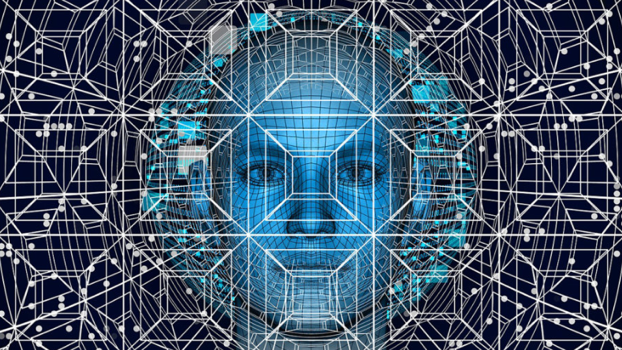
by Editor | Jan 6, 2020 | News
AI is rapidly spreading throughout civilization, where it has the promise of doing everything from enabling autonomous vehicles to navigate the streets to making more accurate hurricane forecasts. On an everyday level, AI figures out what ads to show you on the web, and powers those friendly chatbots that pop up when you visit an e-commerce website to answer your questions and provide customer service. And AI-powered personal assistants in voice-activated smart home devices perform myriad tasks, from controlling our TVs and doorbells to answering trivia questions and helping us find our favorite songs.
But we’re just getting started with it. As AI technology grows more sophisticated and capable, it’s expected to massively boost the world’s economy, creating about $13 trillion worth of additional activity by 2030, according to a McKinsey Global Institute forecast.
“AI is still early in adoption, but adoption is accelerating and it is being used across all industries,” says Sarah Gates, an analytics platform strategist at SAS, a global software and services firm that focuses upon turning data into intelligence for clients.
According to Michael Dukakis Institute for Leadership and Innovation (MDI), AI technology can be a force for helping people achieve well-being and happiness, unleash their potential, obtain greater freedom, relieve them of resource constraints and arbitrary/inflexible rules and processes, and solve important issues, such as SDGs.
The original article can be found here.
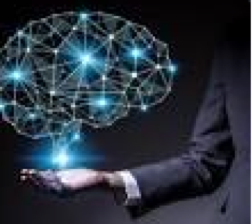
by Editor | Jan 6, 2020 | News
The Brazilian government has taken another step towards the creation of public policies around artificial intelligence (AI).
A national AI strategy will be created as a response to the worldwide race for leadership in the field and the need to discuss the future of work, education, tax, research and development as well as ethics as the application of related technologies becomes more pervasive.
A public consultation has been launched to gather input around how AI can solve the country’s main issues, identify priority areas of focus for the development and use of the technologies, as well as limits for it.
According to the summary on the purpose of the consultation, which ends on January 31, 2020, the government understands that AI can bring improvements to the country’s competitiveness and productivity, as well as the provision of public services, quality of life and to reduce social inequality in the southern hemisphere’s biggest economy.
Brazil adheres to the Organisation for Economic Co-operation and Development (OECD)’s human-centred AI Principles, which provide for recommendations around areas such as transparency and explainability.
Regarding to Artificial Intelligence for Government, Michael Dukakis Institute for Leadership and Innovation (MDI) established AI World Society (AIWS) to design Government AIWS Ethics and Practices Index for tracking the AI government activities in terms of transparency, regulation, promotion and implementation for constructive use of AI.
The original article can be found here.
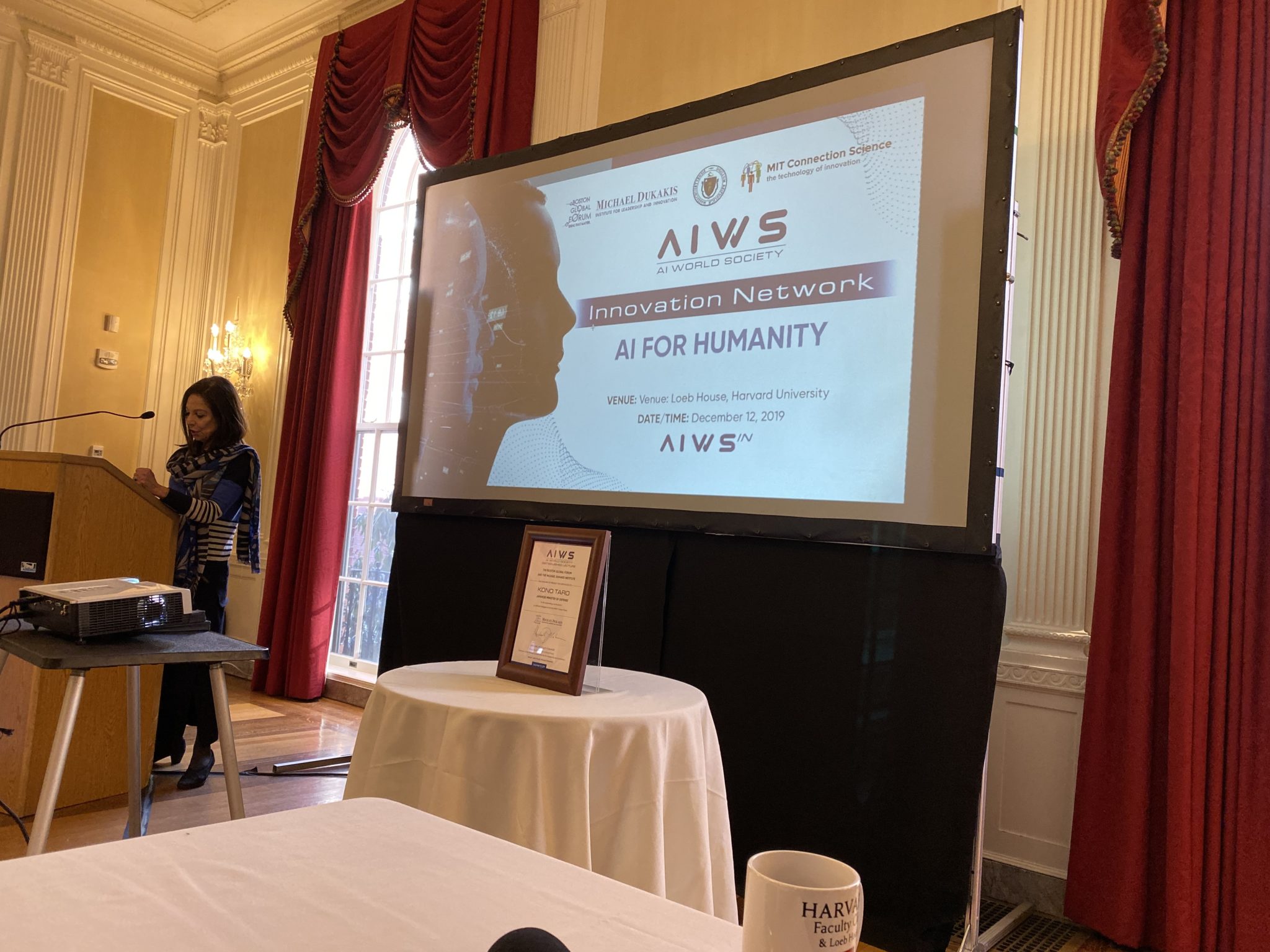
by Editor | Dec 30, 2019 | News
On Global Cybersecurity Day December 12, 2019, at Loeb House, Harvard University, Professor Nazli Choucri, MIT, a co-founder of the AIWS Social Contract 2020 and AIWS Innovation Network, presented updated ideas of the AIWS Social Contract 2020.
The AIWS Social Contract 2020 will be officially launched and presented at AIWS Summit 2020, April 28-29, 2020 at Harvard University. This event will be co-organized by the Boston Global Forum and World Leadership Alliance-Club de Madrid, the largest forum of more than 100 head of states, head of governments of democracy countries, including Bill Clinton, Mikhail Gorbachev, Jimmy Carter, etc.
The video can be found here.
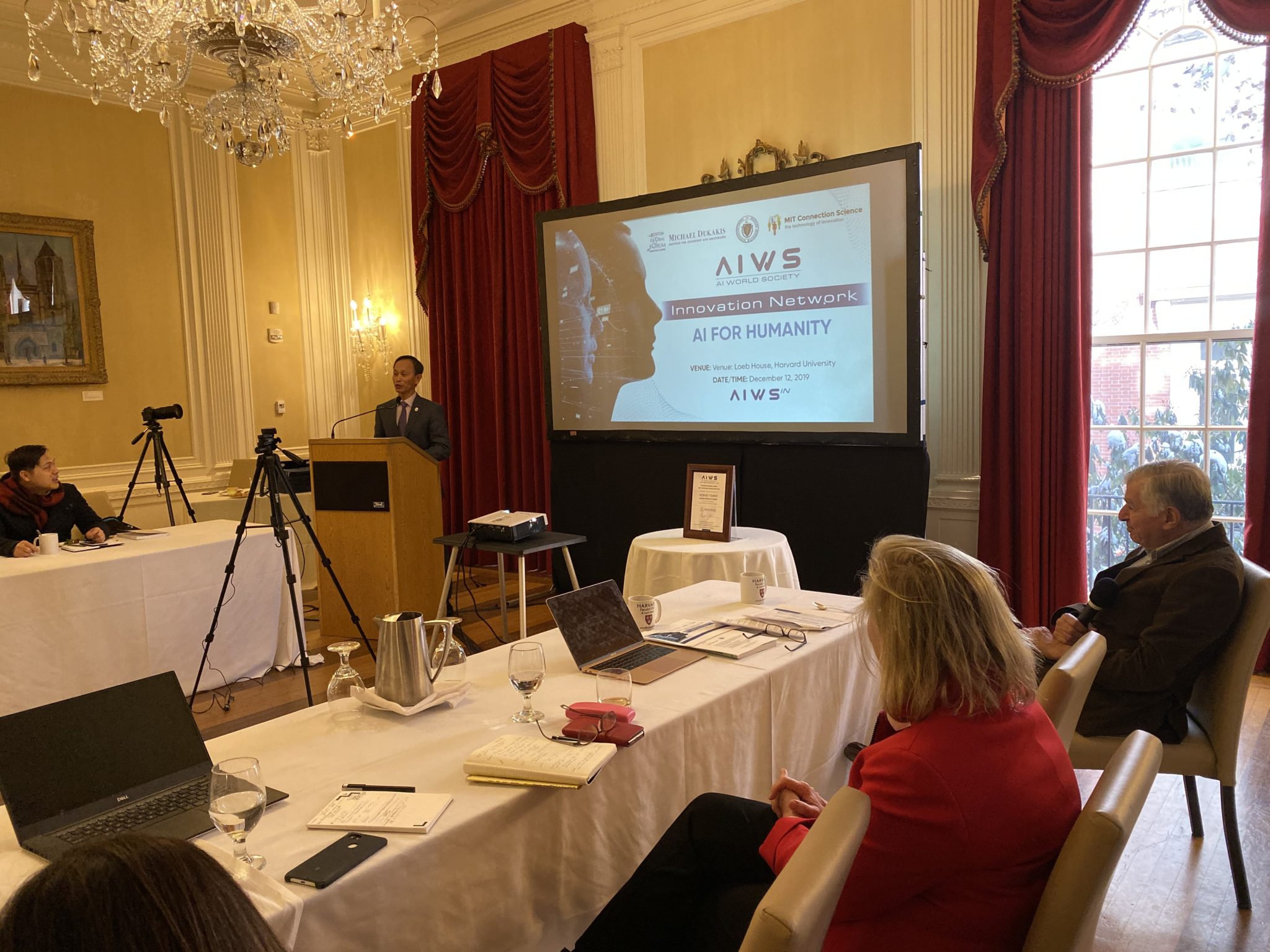
by Editor | Dec 30, 2019 | News
On Global Cybersecurity Day, December 12, at Loeb House, Harvard University, at the launching of AI World Society (AIWS) Innovation Network, the Assistant Secretary of Business Development and International Trade, Government of Massachusetts, Mr. Nam Pham, congratulated AIWS Innovation Network and spoke on AI and cybersecurity. The Government of Massachusetts is one of the sponsors of AIWS Innovation Network.
The video can be found here.








